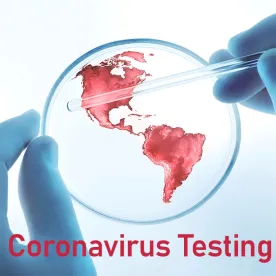Employers now have greater clarity on how the new federal requirements covering COVID-19 testing and diagnosis apply to their group health plans, under guidance issued by the U.S. Department of Labor, U.S. Department of Health and Human Services, and U.S. Department of Treasury.
The April 11, 2020, guidance, which answers frequently asked questions (FAQs), touches on requirements enacted as part of the Families First Coronavirus Response Act (FFCRA) and the Coronavirus Aid, Relief, and Economic Security (CARES) Act.
Though the agencies answer a number of questions, some pressing employer concerns are left unaddressed, including whether the Internal Revenue Code Section 125 rules will be liberalized to give greater latitude for mid-year election changes in response to the pandemic. The agencies have stated that they expect to issue further guidance.
Here are the key takeaways from the FAQs:
-
Covered plans
The COVID-19 testing requirements apply to group health plans generally, as well as to health insurers that underwrite group and individual coverage. Covered plans include insured or self-insured plans under the Employee Retirement Income Security Act of 1974 (ERISA), grandfathered plans under the Affordable Care Act, non-federal governmental plans, and church plans.
The requirements do not apply to short-term limited duration insurance, excepted benefit plans (such as standalone dental and vision plans), retiree-only plans, or other plans that cover fewer than two current employees.
-
Serological tests
The FFCRA, as amended by the CARES Act, requires plans to cover in vitro diagnostic COVID-19 testing, including products approved by the U.S. Food and Drug Administration (FDA), and products for which the developer has requested (or intends to request) emergency use authorization from the FDA.
The FAQs clarify that plans are required to cover serological tests, which are used to detect antibodies against the virus that causes COVID-19 and to diagnose “the disease or condition of having current or past infection” with the virus. (According to the FAQs, however, the FDA does not believe that such tests should be the sole basis for a diagnosis.)
-
Medical necessity
The FFCRA, as amended by the CARES Act, requires plans to cover products and services provided during a visit that relate to COVID-19 testing, or that relate to the evaluation of an individual to determine whether testing is needed. These products and services must be covered on a first-dollar basis and without medical management, such as pre-authorization.
The statute does not expressly state whether plans could continue to apply their standard definitions of medical necessity to testing products and services. The FAQs clarify that the evaluation of the need for testing will be done by the “attending healthcare provider in accordance with accepted standards of current medical practice.”
This will represent a shift for many third-party administrators of employer health plans, which would often be tasked with determining whether a particular diagnostic test was medically necessary under the terms of a specific plan.
-
Office visits
The FFCRA, as amended by the CARES Act, requires coverage of testing items and services furnished during office visits (including telehealth visits), as well as visits to urgent care and the emergency room. The FAQs clarify that the regulators will construe the term “visit” broadly to include non-traditional settings such as “drive-through screening and testing sites where licensed healthcare providers are administering COVID-19 diagnostic testing.”
-
Waiver of notice requirements
The FFCRA, as amended by the CARES Act, sets new testing requirements for plans, effective March 18, 2020. Ordinarily, if a plan makes a mid-year material modification (as defined by ERISA) to a plan term that would affect the content of its most recent Summary of Benefits and Coverage (SBC), the plan is required to give 60 days’ advance notice.
Not surprisingly, the agencies indicate that they will not take enforcement action against a plan that improves its coverage related to COVID-19 diagnosis or treatment without providing 60 days’ advance notice. The FAQs also outline a similar non-enforcement policy with respect to plans that add benefits or reduce cost sharing for telehealth or other remote care services (not just services directly tied to COVID-19). These non-enforcement policies apply during the declared public health emergency.
-
State requirements
The FAQs make clear that nothing in the FFCRA or CARES Act prevents states from imposing additional standards or requirements on health insurers with respect to COVID-19 diagnosis or treatment as long as to the state rule does not prevent the application of a federal standard.
-
Excepted benefits
An employee assistance program (EAP) may be an “excepted benefit” that is not subject to certain ERISA or tax rules, if it “does not provide significant benefits in the nature of medical care.” The FAQs clarify that an EAP that does not provide significant medical care benefits will not lose its status as an excepted benefit program solely because it offers coverage for COVID-19 testing and diagnosis.
Coverage of an on-site clinic is also considered an “excepted benefit,” and the FAQs indicate that status would not change solely because a clinic offers COVID-19 testing and diagnosis.





 />i
/>i
